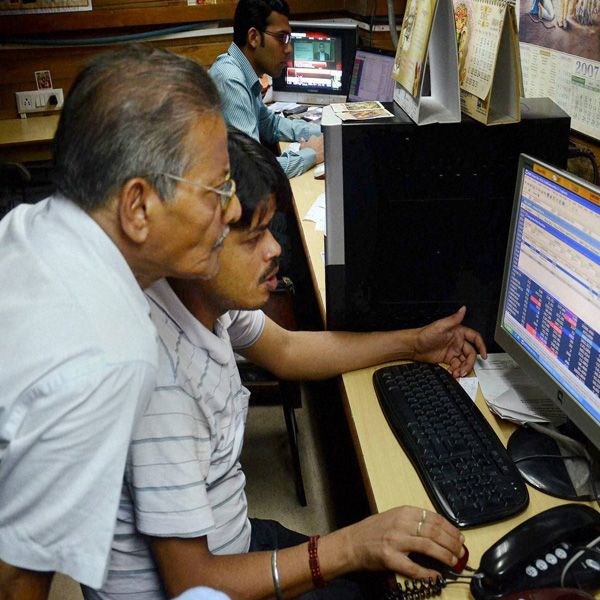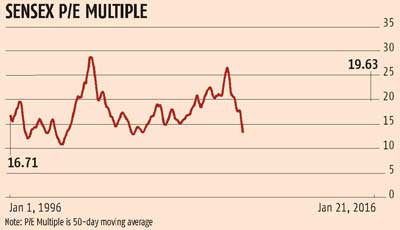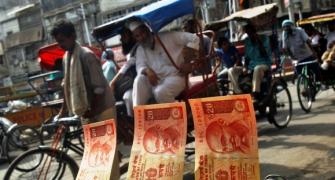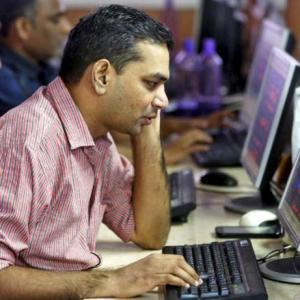 Benchmark indices could fall at least another 10% before they rebound, based on trends in past bear runs
Benchmark indices could fall at least another 10% before they rebound, based on trends in past bear runs
With the benchmark index, the S&P BSE Sensex, having fallen 20 per cent from its peak recorded in January 2015, the question on everyone’s mind is whether the market will rebound or there will be further pain.
A sharp correction in the past three weeks has raised the prospects of a bear run on the Dalal Street, which means poor returns for equity investors for some time.
A bearish spell on the Street is, however, also an opportunity to load-up on top quality stocks at low valuations.
So, should investors open their wallet to make select purchases or wait for further downside?
Experts remain divided.
Saurabh Mukherjea, chief executive officer, institutional equities, at Ambit Capital, believes the bottom for the market will be around 22,000 on the Sensex.
This translates into a further 10 per cent decline in the benchmark index from Friday’s close.
Adding: “If the Sensex hits 22,000, its price to earnings (P/E) multiple will be similar to what it was within six months of the Lehman crisis (of 2008).
"In our mind, that will be a reasonably stressed valuation for the Sensex. We would then turn around and say, now it makes sense to buy India even if the economy doesn’t turn around in a hurry,” says Mukherjea.
The average six-month P/E on a one-year forward basis for the Sensex was 14 times after the Lehman crisis.
An earnings multiple of 14 on FY17 earnings estimates gives 22,000 on the Sensex.
“At 22,000, the market will factor in the economic downturn and it will be time to buy selectively.
"We will see the bottom of the stock market in the next six months and the economy will bottom out over the next four to five quarters,” said Mukherjea.
Others see bigger cuts in the market, given the widening divergence between corporate earnings growth and stock valuations.
“Earnings growth has been falling consistently since the high of the post-Lehman recovery in FY11.
"Nifty companies' net profit has grown by around five per cent in FY15 and a similar growth is expected this financial year.
"Such an earnings trajectory should command a PE multiple of around 12, against the current one of around 19,” says Dhananjay Sinha, head, institutional equity, Emkay Global Financial Services.
The Sensex underlying earnings per share is Rs 1,337, down six per cent on a year-on-year basis.
 Assuming 10 per cent incremental earnings growth during the next two quarters, including the current one, a fair value for the Sensex works out to 17,700 under Sinha’s assumption and around 20,000 under Mukherjea’s calculation.
Assuming 10 per cent incremental earnings growth during the next two quarters, including the current one, a fair value for the Sensex works out to 17,700 under Sinha’s assumption and around 20,000 under Mukherjea’s calculation.
The index valuation ratios during previous downturns suggest markets have invariably bottomed out at PE valuations ranging from 11 to 17 times.
During a deep market correction such as in the late 1990s, the dotcom bust of 2000-01 and the Lehman crisis of 2008, when the indices had plunged from their highs, value buying emerged at a trailing PE of around 12x (see chart).
In contrast, during mild corrections such as in 2006 and 2010-11, when the indices corrected by 29 and 28 per cent, respectively, the valuation bottomed-out at around 16.5x on a trailing PE. Similarly, during 2013, the market rebounded from the PE of 17x.
The optimist, however, says there is little downside risk for investors at current levels and it would be a right strategy to start nibbling at select stocks.
“The Indian market has reached a bottom, given our strong macro economic ratios and high likelihood of a strong earnings growth, beginning the second half of FY16-17.
"Unless, of course, you believe the global economy will implode within the next few quarters,” says G Chokkalingam, CEO, Equinomics Research & Advisory.
All experts agree on one thing.
It is time to look for downside protection rather than upside potential while hunting for bargain deals on Dalal Street.
Following this might, however, mean unlearning the skills that help you make money during a bull-run.
Image: Stock traders. Photograph: Reuters










